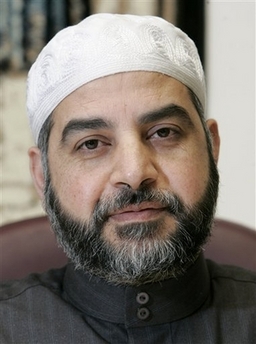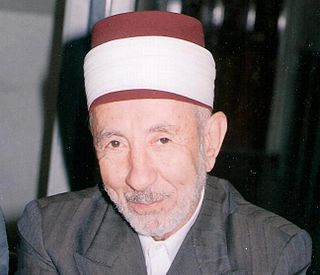Related Research Articles

Fiqh is Islamic jurisprudence. Fiqh is often described as the style of human understanding and practices of the sharia, that is human understanding of the divine Islamic law as revealed in the Quran and the sunnah. Fiqh expands and develops Shariah through interpretation (ijtihad) of the Quran and Sunnah by Islamic jurists (ulama) and is implemented by the rulings (fatwa) of jurists on questions presented to them. Thus, whereas sharia is considered immutable and infallible by Muslims, fiqh is considered fallible and changeable. Fiqh deals with the observance of rituals, morals and social legislation in Islam as well as economic and political system. In the modern era, there are four prominent schools (madh'hab) of fiqh within Sunni practice, plus two within Shi'a practice. A person trained in fiqh is known as a faqīh.
A fatwa is a legal ruling on a point of Islamic law (sharia) given by a qualified Islamic jurist (faqih) in response to a question posed by a private individual, judge or government. A jurist issuing fatwas is called a mufti, and the act of issuing fatwas is called ifta'. Fatwas have played an important role throughout Islamic history, taking on new forms in the modern era.
Sharia,Sharī'ah, Shari'a, Shariah or Syariah is a body of religious law that forms a part of the Islamic tradition based on scriptures of Islam, particularly the Qur'an and hadith. In Arabic, the term sharīʿah refers to Allah's immutable divine law and this is contrasted with fiqh, which refers to its interpretations by Islamic scholars. Fiqh, practical application side of sharia in a sense, was elaborated over the centuries by legal opinions issued by qualified jurists and sharia has never been the sole valid legal system in Islam historically; it has always been used alongside customary law from the beginning, and applied in courts by ruler-appointed judges, integrated with various economic, criminal and administrative laws issued by Muslim rulers.
Religious law includes ethical and moral codes taught by religious traditions. Different religious systems hold sacred law in a greater or lesser degree of importance to their belief systems, with some being explicitly antinomian whereas others are nomistic or "legalistic" in nature. In particular, religions such as Judaism, Islam and the Baháʼí Faith teach the need for revealed positive law for both state and society, whereas other religions such as Christianity generally reject the idea that this is necessary or desirable and instead emphasise the eternal moral precepts of divine law over the civil, ceremonial or judicial aspects, which may have been annulled as in theologies of grace over law.

The Hanafi school or Hanafism is one of the four major schools of Islamic jurisprudence within Sunni Islam. It was established by the 8th-century scholar, jurist, and theologian Abu Hanifa, a follower whose legal views were primarily preserved by his two disciples Abu Yusuf and Muhammad al-Shaybani. As the oldest and most-followed of the four major Sunni schools, it is also called the "school of the people of opinion". Many Hanafis also follow the Maturidi school of theology.

A madhhab refers to any school of thought within Islamic jurisprudence. The major Sunni madhāhib are Hanafi, Maliki, Shafi'i and Hanbali. They emerged in the ninth and tenth centuries CE and by the twelfth century almost all jurists aligned themselves with a particular madhab. These four schools recognize each other's validity and they have interacted in legal debate over the centuries. Rulings of these schools are followed across the Muslim world without exclusive regional restrictions, but they each came to dominate in different parts of the world. For example, the Maliki school is predominant in North and West Africa; the Hanafi school in South and Central Asia; the Shafi'i school in East Africa and Southeast Asia; and the Hanbali school in North and Central Arabia. The first centuries of Islam also witnessed a number of short-lived Sunni madhhabs. The Zahiri school, which is considered to be endangered, continues to exert influence over legal thought. The development of Shia legal schools occurred along the lines of theological differences and resulted in the formation of the Ja'fari madhhab amongst Twelver Shias, as well as the Isma'ili and Zaidi madhhabs amongst Isma'ilis and Zaidis respectively, whose differences from Sunni legal schools are roughly of the same order as the differences among Sunni schools. The Ibadi legal school, distinct from Sunni and Shia madhhabs, is predominant in Oman. Unlike Sunnis, Shias, and Ibadis, non-denominational Muslims are not affiliated with any madhhab.

Mullah is an honorific title for Muslim clergy and mosque leaders. The term is widely used in Iran and Afghanistan and is also used for a person who has higher education in Islamic theology and sharia law.

A mufti is an Islamic jurist qualified to issue a nonbinding opinion (fatwa) on a point of Islamic law (sharia). The act of issuing fatwas is called iftāʾ. Muftis and their fatwas played an important role throughout Islamic history, taking on new roles in the modern era.

Islam is the official religion of the United Arab Emirates. Of the total population, 76.9% are Muslims as of a 2010 estimate by the Pew Research Center. Although no official statistics are available for the breakdown between Sunni and Shia Muslims among noncitizen residents, media estimates suggest less than 20 percent of the noncitizen Muslim population are Shia.
Principles of Islamic jurisprudence are traditional methodological principles used in Islamic jurisprudence (fiqh) for deriving the rulings of Islamic law (sharia).
Talal Eid is an imam from Lebanon who has combated the portrayal of Muslims as terrorists and served as Commissioner of the US Commission on International Religious Freedom.

Zaid Shakir is an American Muslim scholar and co-founder of Zaytuna College in Berkeley, California. He teaches courses on Arabic, law, history, and Islamic spirituality.
On November 20, 2006, 6:30 pm, six Muslim imams were removed from US Airways Flight 300 to Phoenix, Arizona, at Minneapolis-Saint Paul International Airport, because several passengers and crew members became alarmed by what they felt was suspicious behavior. The airline has stated that the captain delayed takeoff and called airport security workers to ask the imams to leave the plane; the men refused, and that the captain then called police. The plane left without the imams on board about three hours later. The imams were arrested, questioned, and then released.
Various sources of Islamic Laws are used by Islamic jurisprudence to elaborate the body of Islamic law. In Sunni Islam, the scriptural sources of traditional jurisprudence are the Holy Qur'an, believed by Muslims to be the direct and unaltered word of God, and the Sunnah, consisting of words and actions attributed to the Islamic prophet Muhammad in the hadith literature. In Shi'ite jurisprudence, the notion of Sunnah is extended to include traditions of the Imams.

Mohammad Ahmad Hasan Qatanani is the Imam of the Islamic Center of Passaic County in New Jersey. Mohammad Ahmad Hasan Qatanani migrated to America in 1996 as the Imam of the Islamic Center of Passaic County. Qatanani has a Ph.D. in Islamic studies from Jordanian University.
Twelver Shīʿism, also known as Imāmiyya, is the largest branch of Shīʿa Islam, comprising about 90% of all Shīas. The term Twelver refers to its adherents' belief in twelve divinely ordained leaders, known as the Twelve Imams, and their belief that the last Imam, Imam al-Mahdi, lives in Occultation and will reappear as the promised Mahdi.
Wahbah Mustafa al-Zuhayli born in Dair Atiah, Syria was a Syrian professor and Islamic scholar specializing in Islamic law and legal philosophy. He was also a preacher at Badr Mosque in Dair Atiah. He was the author of scores of books on Islamic and secular law, many of which have been translated to English. He was chairman of Islamic jurisprudence in the College of Sharia at Damascus University, and a signatory to the Amman Message and A Common Word documents.
Islam is an Abrahamic monotheistic religion teaching that there is only one God (Allah) and that Muhammad is His last Messenger.

The World Islamic Science & Education University is an Islamic university in Amman, Jordan that was established in 2008. The university is the permanent seat of the Arabic Language and Nation Identity Conference. It is accredited by the Jordanian Ministry of Higher Education and Scientific Research.

Muhammad Said Ramadan Al-Bouti was a renowned Syrian Sunni Muslim scholar, writer and professor, where he was vice dean in the Damascus University and served as the imam of the Umayyad Mosque.
References
- ↑ Pamela Miller, “Imam, a U.S. citizen, denies terror links,” Star Tribune, Dec. 6, 2006
- ↑ The Washington Post, September 10, 2002, posted at Mysterious Trip to Flight 77 Cockpit
- 1 2 The Assembly of Muslim Jurists in America
- ↑ The Graduate Theological Foundation faculty list
- ↑ Fear Pushed Some Away, Most Came Back, Arizona Daily Wildcat, September 11, 2002
- ↑ The Real Target of the 6 Imams' Discrimination Suit
- ↑ MAS Freedom Foundation Leads Powerful Interfaith Response to Air Travel Profiling Archived 2007-09-28 at the Wayback Machine
- ↑ Uproar follows imams' detention Archived 2006-11-30 at the Wayback Machine
- ↑ Flying while Muslim
- 1 2 "Arizona Was Home to bin Laden Sleeper Cell"
- ↑ "Ariz. Muslim leaders face increased FBI scrutiny"